Is Your Mattress to Blame For a Poor Night Sleep?
When is the last time you considered how your daily actions and household factors influenced your quality of sleep? Okay, exclude last Friday, we know it was a late night out. Really, when's the last time you challenged yourself to improve your sleep over back-to-back-to-back consecutive nights? Turns out, if you focus on improvement, it works.
We're quick to blame our mattress, but replacing it doesn't always cure a bad night's sleep. To look deeper at our own individual habits, look towards smart tech. New technologies for the home have transformed how millions around the world interpret their own sleep habits. During National Sleep Awareness Week, pay attention to things you can do to improve your overall sleep health.
The research reports that around the world, millions of users have taken to using a fitness tracker during the day and sleep tracking with the same smart technology on a nightly basis. I've also done this for years, so it's nice to know I'm not alone: analyzing sleep data has become a staple of my morning routine. I find it interesting to see how well I slept (biometrically), but it's also nice to track household details, like how long I was up with a sick child in the middle of the night. Furthermore, I'm compelled to see how my daily activities influence my sleep — were those extra 5,000 steps rewarded with extra deep sleep, or was that 10pm cheeseburger affecting me at 2:30am?
To gain a deeper insight into sleep trends, Samsung leveraged its access to data worldwide to demystify bad sleep data. From there, it developed a system for coaching users to retrain good sleep behaviors. (This is where we stop blaming our mattress for a lousy night.)
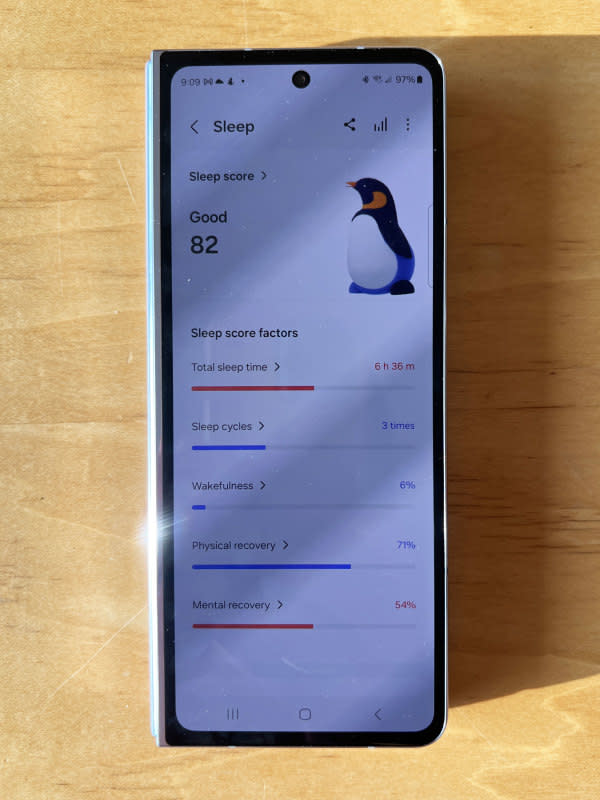
Emily Fazio
The Research
Data from Samsung's sleep study reflects 716 million nights of user data from January to May 2021, and the same period in 2023. Highlights from the research include:
Sleep duration dropped by 4 minutes from 2021 to 2023. It may not seem like much, but by falling from 7 hours and 3 minutes to 6 hours and 59 minutes globally, users fell below the essential 7-hour threshold recommended by The National Sleep Foundation.
More awake time during sleep. The study showed an increase from 48.8 minutes to 50.1 minutes on average. This trend is reflected for all sexes, age groups, and regions. North America experienced the greatest decrease in sleep efficiency.
Sleep coaching was a success. The majority of users worldwide fall into one of seven animal groups, each group with distinct sleep patterns and characteristics. From there, Samsung offers customized sleep coaching to guide users to help improve sleep quality by changing small daily habits. All groups saw improvement in sleep scores after two months. "Exhausted Shark," users in the most visibly sleep-deprived category, experienced a 32% improvement on sleep between the first and second month of sleep coaching.
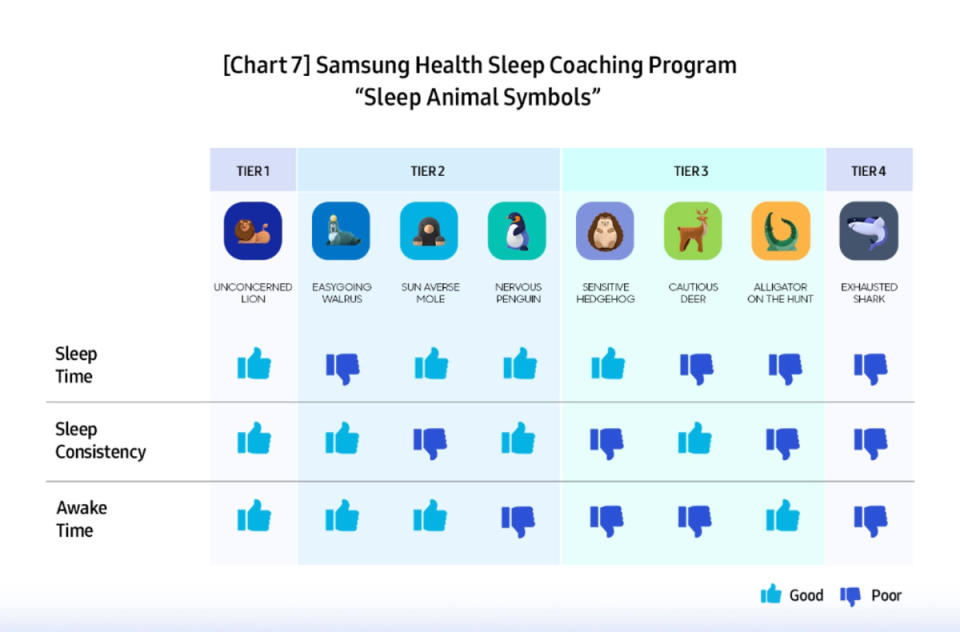
Samsung
Testing Samsung Sleep Coaching
In recognition of 2024 Sleep Awareness Week, Samsung sent its Galaxy Watch6 and Galaxy Z Fold5 so I could test drive its sleep monitoring and get personalized sleep coaching tips. And, as I've said, I've been monitoring my sleep for years on other smart tech, but none of it was as sophisticated as the reporting that I've been using in the Samsung Health app. It captured every time I turned over in bed, which was... often.
The Samsung health app reports on data measured by the Galaxy Watch6. Key components to grading your sleep score include:
Total sleep time. Most people need 7-9 hours to feel clear the next day. When your sleep time is too short or too long, it'll reduce your sleep score.
Wakefulness. If you're awake more than 10% of the night, it'll negatively impact your sleep score.
Mental recovery. A factor of your REM sleep, mental recovery is key for learning, memory, and emotional and mental health. REM sleep should be in the 19% to 23% range.
Sleep cycles. Most adults need 3-6 sleep cycles to have a sufficient mental and physical recovery overnight. Too few or too many can affect your overall sleep score.
Physical recovery. Deep sleep is essential for tissue growth and repair. The more you get, the more you can recover. As deep sleep occurs earlier in the night, your sleep score is higher if you get sufficient deep sleep in the first sleep cycle.
The app reports on other metrics with precision, too:
Time awake overnight, vs. sleep stage: REM sleep, light sleep, and deep sleep
Blood oxygen levels
Heart rate
Skin temperature
Stress levels
Breathing patterns
Snoring (yes, it can even record it!)
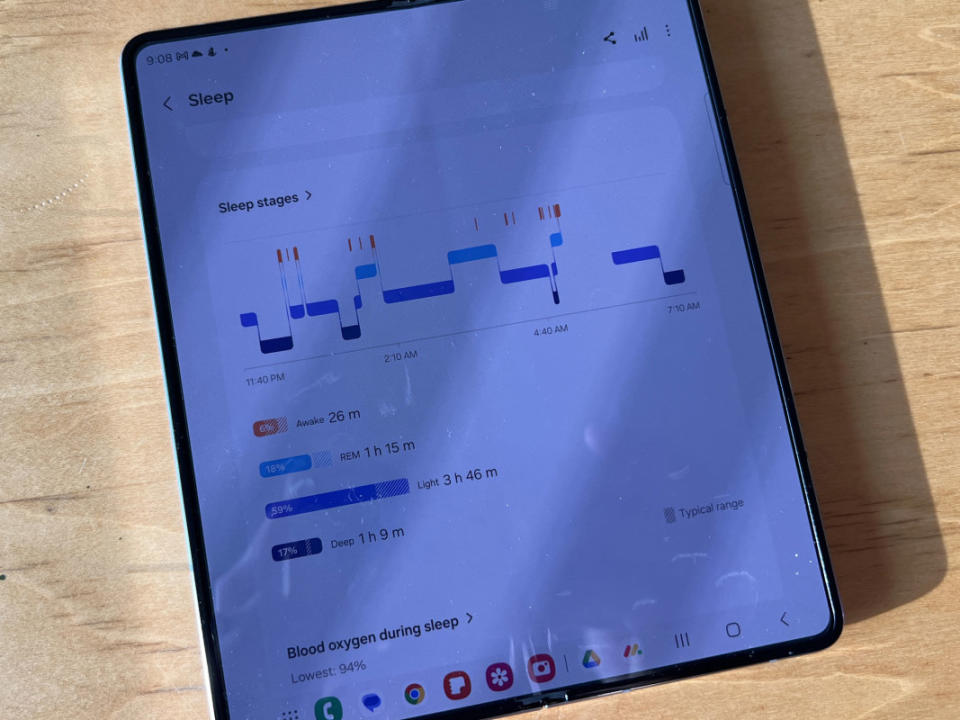
Emily Fazio
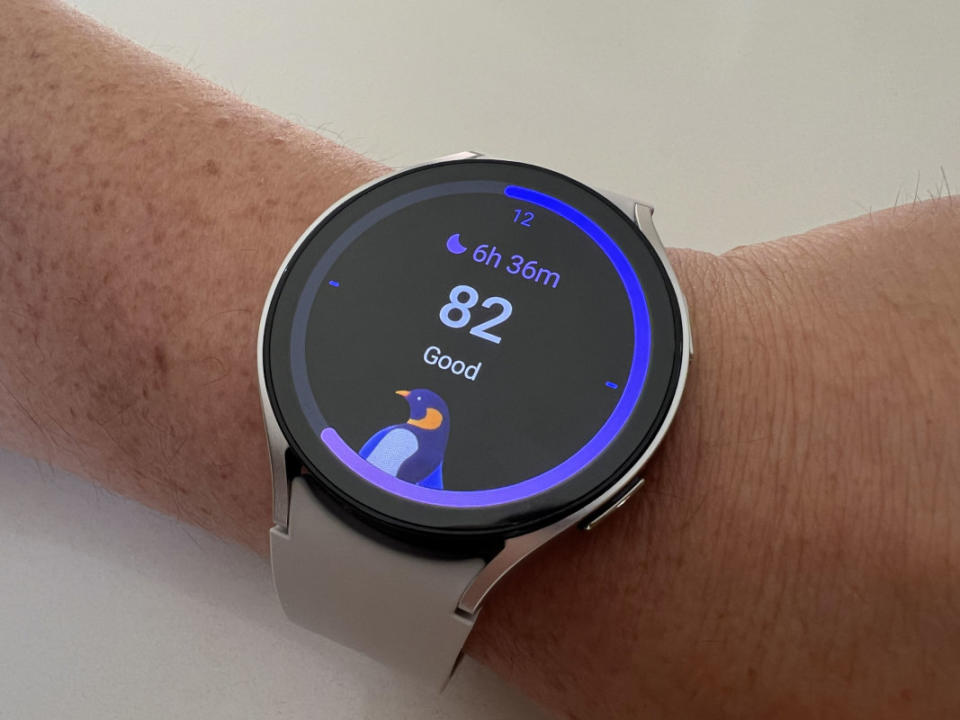
Emily Fazio
I'm a Nervous Penguin.
After a week of testing, my sleep score ranged from 82-93. My overall habits landed me into the category of Nervous Penguin, by and large the most common sleep animal symbol represented by my age group. Represented by 1/3 of the participants in the study, I'm smack between the Sun Averse Mole and the Sensitive Hedgehog. "[The Penguin] maintains healthy circadian rhythms yet frequently experiences interruptions during sleep, contributing to diminished sleep efficiency," Samsung reports. I don't have chronic sleep issues, but it's evident that smart bedroom technology trusts that I can improve over a period of time.
Creating a Sleep Routine
The suite of Sleep Coaching programs recommended several changes, namely in that I should build better habits and go to bed earlier, and make my bed my sleeping place by avoiding phone browsing and late-night snacking. According to the data, if I follow its advice, I may be among the 21% of users who improve their sleep animal after two months of coaching—and that's without upgrading my mattress.
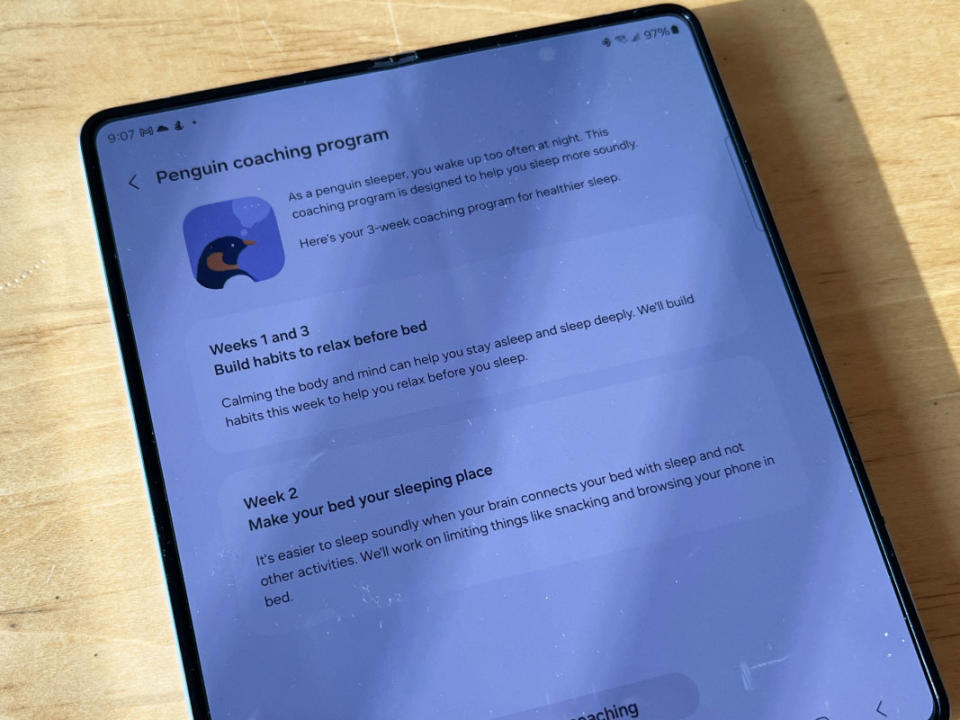
Emily Fazio

Emily Fazio
Other Smart Tech for the Bedroom Environment
Smart Bed
Forget traditional mattress shopping and aim straight for a smart bed. Equipped with various advanced features to optimize sleep quality and overall comfort, smart mattresses have sensors to track your sleep patterns and adjust the firmness and temperature of the mattress. Some smart beds also offer features like built-in speakers, smart lighting, and integration with other smart home devices to create a more personalized and connected sleep experience.
Smart Curtains
Smart curtains respond using a smartphone or voice commands, and can also be programmed to open and close at specific times of the day. Using natural daylight to regulate your circadian rhythms can help improve your quality of sleep. Some smart curtains are also equipped with sensors that can detect changes in lighting or temperature throughout the day, automatically adjusting themselves to maintain a comfortable indoor environment.
Smart Light Bulbs
Smart bulbs have been a life changer for us in many ways. Controlled remotely via a smartphone, tablet, or smart home device, they're connected to our home's Wi-Fi network. The kids love that they can adjust the color; I love that I can adjust the brightness and even schedule when the lights turn on and off. It's not only convenient, but helps us save energy.
Smart Alarm Clocks
Some of the best alarm clocks marry technology. It may be your new white noise machine, delivering soothing sounds through its smart speakers. It may offer light therapy with subtle wake-up lights to support a healthy circadian rhythm.

